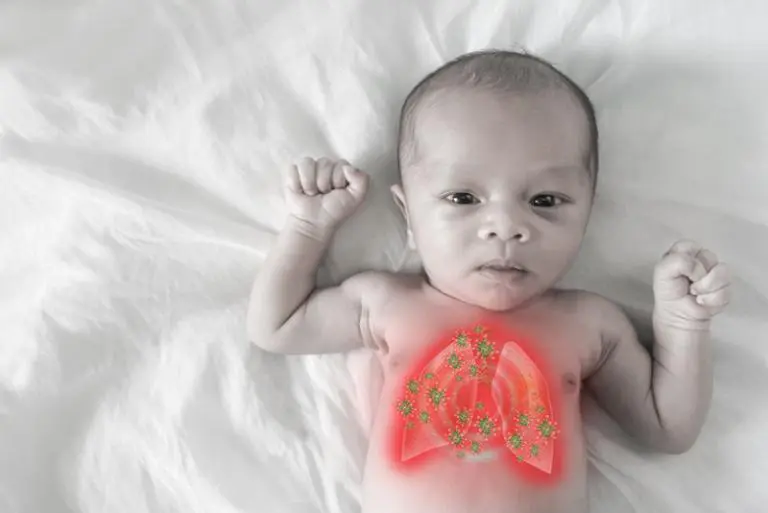Pneumonia in Children & Babies: Symptoms, Home Treatments & More
What Is Pneumonia?
Pneumonia is an infection of the lungs, which can be caused by viruses or by bacteria.

Symptoms And Signs Of Pneumonia in Children and Babies?
The following symptoms can be observed in children and babies when they’re infected with pneumonia:
- Fever, sometimes with chills
- Coughing, usually with a lot of phlegm
- Occasional painful breathing
- Fast or difficulty in breathing
- Some can have associated non-specific and seemingly unrelated symptoms such as abdominal pain, vomiting or diarrhoea
- Abnormal sounds when the doctor listens to or taps on the chest of the patient
- Abnormal patch (infiltrate) on chest X-ray
How is Pneumonia in Children Diagnosed?
Doctors will usually perform a pneumonia diagnosis after an examination.
During the diagnosis, the doctors will check the child’s appearance, breathing patterns, vital signs, and listen to the lungs for abnormal sounds.
A chest X-ray scan or blood tests might be necessary in order to ensure an accurate diagnosis.
Treatment of Bacterial Pneumonia and Viral Pneumonia
Only bacterial pneumonia is treatable by antibiotics (e.g. Amoxicillin, Amoxicillin-Clavulanate, Clarithromycin etc., choice dependent on the suspected bacteria and the condition of the patient).
Viral pneumonia does not respond to antibiotics, but certain cases caused by the Influenza virus may respond to an anti-viral medication called Tamiflu (Oseltamivir).
As it is difficult to distinguish bacterial from viral pneumonia in all cases, antibiotics are usually prescribed.
How Long Does Pneumonia Last for Children and Babies?
With a course of appropriate antibiotics, the fever should settle within 48 to 72 hours from the start of the antibiotics. The coughing may take longer, up to 2 weeks, to resolve.
However, severe cases of pneumonia will need to be admitted to hospital for injection antibiotics (e.g. Ampicillin, Amoxicillin-Clavulanate, Ceftriaxone etc., choice dependent on the suspected bacteria and the condition of the patient).
Discharge Instructions For Pneumonia Home Treatment
Upon discharge from the hospital, here are some of the instructions that you should follow for the pneumonia home treatment for your baby or child.
- Antibiotics: You must complete the course of antibiotics as prescribed by your doctor.
- Medicines for fever: Use paracetamol or ibuprofen for fever. This can be repeated every 6 hours. If the fever is 39.5°C or more, you may use the paracetamol every 4 hourly, but only for 1 to 2 days, and subsequently reduced to every 6 hourly. Ibuprofen should be reserved for temperature 38.5°C and above, and it can only be repeated every 6 hours.
- Warm fluids for coughing spasms: Coughing spasms are often caused by sticky secretions in the back of the throat. Warm fluids usually relax the airway and loosen the secretions.
- Follow-Up Appointments: Your child needs to be reviewed by a doctor. Keep the appointment as given by your attending doctor.
Should You Consult a Paediatrician?
Consult your paediatrician if your baby or child has the following symptoms.
- Your child is breathless.
- The fever is persistent beyond 2 to 3 days from start of antibiotics.
- Your child is lethargic.
- There is poor feeding.
- Your child is not retaining the oral antibiotics due to vomiting. In which case, he/she may need to be admitted to hospital for injection antibiotics, or a change of antibiotics by your doctor.
- Your child complains of chest pain.
Preventing Pneumonia in Children and Babies
- By ensuring that your child has completed his/her vaccinations, especially Pneumococcal (Prevenar 13) and Haemophilus influenzae (part of 5-in-1 and 6-in-1 vaccinations). This would help provide protection against the more common bacterial causes of pneumonia. However, please note that there are several other bacteria (e.g. Mycoplasma pneumoniae, Staphylococcus aureus, Moraxella Catarrhalis), which can cause pneumonia and there are currently no vaccinations effective against these bacteria.
- By having annual Influenza vaccinations for your child and your family, you can reduce the risk of Influenza infection, which can cause pneumonia and other chest infections such as bronchitis/bronchiolitis as well. However, please also note that there are many other viruses (e.g. Respiratory Syncytial Virus, RSV), which can cause chest infections and there are currently no vaccinations effective against these viruses.
- By washing hands and staying away from people who are sick

